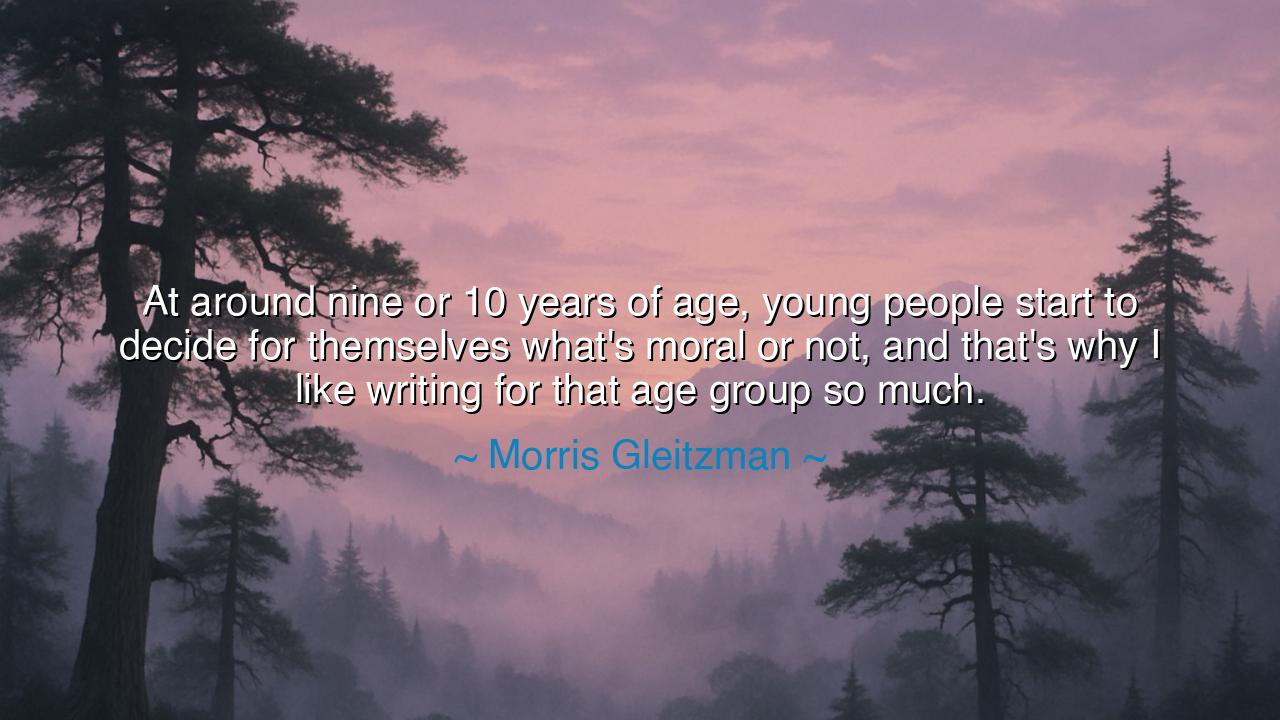
At around nine or 10 years of age, young people start to decide
At around nine or 10 years of age, young people start to decide for themselves what's moral or not, and that's why I like writing for that age group so much.






In the words of Morris Gleitzman, “At around nine or 10 years of age, young people start to decide for themselves what’s moral or not, and that’s why I like writing for that age group so much.” This is not merely the reflection of a storyteller—it is the observation of a sage who understands the sacred moment when a child first begins to awaken to conscience. Gleitzman, whose books have given voice to the young and the voiceless alike, speaks here of that fragile turning point in human growth when the heart begins to discern good from evil, justice from cruelty, kindness from indifference. To him, that age—neither wholly innocent nor yet hardened by the world—is the dawn of moral awareness, the hour when the human soul first chooses its path.
In the early years of life, a child’s world is shaped by the rules of others—by the voices of parents, teachers, and elders. Right and wrong are given as commandments, not discovered as truths. But at the threshold of ten years, something stirs within: the birth of inner judgment. The child begins to question not just what is, but what should be. It is a holy moment, a quiet revolution of the soul, when morality ceases to be obedience and becomes understanding. Gleitzman writes for that age because he knows that stories have the power to water the roots of compassion just as they form. The tale, like a mirror, helps the child see not only the world’s shape, but their own reflection within it.
The ancients, too, recognized this transformation. In the schools of Athens, the philosopher Plato taught that education was not the filling of a vessel but the kindling of a flame. He believed that the young must first learn to love virtue before they could reason about it. This love begins not in adulthood but in childhood—when curiosity awakens, and the young heart hungers to understand justice, courage, and truth. To reach a child at that moment, as Gleitzman seeks to do, is to help shape the future of civilization itself. For every adult who acts with conscience once had a teacher, a story, or a moment that awakened that light within them.
Consider the story of Anne Frank, whose diary, written at the tender age of thirteen, shines as one of the most profound moral voices of the twentieth century. Though surrounded by hatred and fear, her words reveal a spirit that had already begun, years before, to grapple with the meaning of right and wrong, love and cruelty. “In spite of everything,” she wrote, “I still believe that people are really good at heart.” That belief was not naive—it was born of moral choice, the result of a young person’s heart wrestling with the shadows of her time. Anne Frank was proof that moral awakening begins not in age or intellect, but in the purity of conscience.
Gleitzman’s insight, then, is a call to all who shape the young—to parents, teachers, writers, and elders alike. Between the ages of nine and ten lies a fleeting window, when imagination and empathy intertwine. What the child sees, hears, and feels in those years will echo throughout their life. If we offer them stories of courage, they will grow brave; if we show them acts of kindness, they will learn compassion; if we speak truth with gentleness, they will learn that wisdom and mercy can dwell together. To neglect this season is to risk raising a generation adrift, guided not by conscience but by convenience.
The lesson, my child, is this: guard the moral awakening of the young as you would guard a sacred flame. Speak truth to them, but also wonder. Teach them not only rules, but reasons. Let them witness goodness in action, for example is the first teacher and story the second. And when they question the world—as they surely will—answer not with scorn, but with patience, for questioning is the beginning of understanding.
So remember the wisdom of Morris Gleitzman: that between the innocence of childhood and the reason of adulthood lies a golden bridge—the age of moral discovery. It is there that the heart first learns its own compass, and the soul begins to choose the direction it will sail for the rest of its days. Nourish that time. Honor it. For from those early judgments, born in the hearts of children, the destiny of humanity itself is written anew with every generation.






AAdministratorAdministrator
Welcome, honored guests. Please leave a comment, we will respond soon